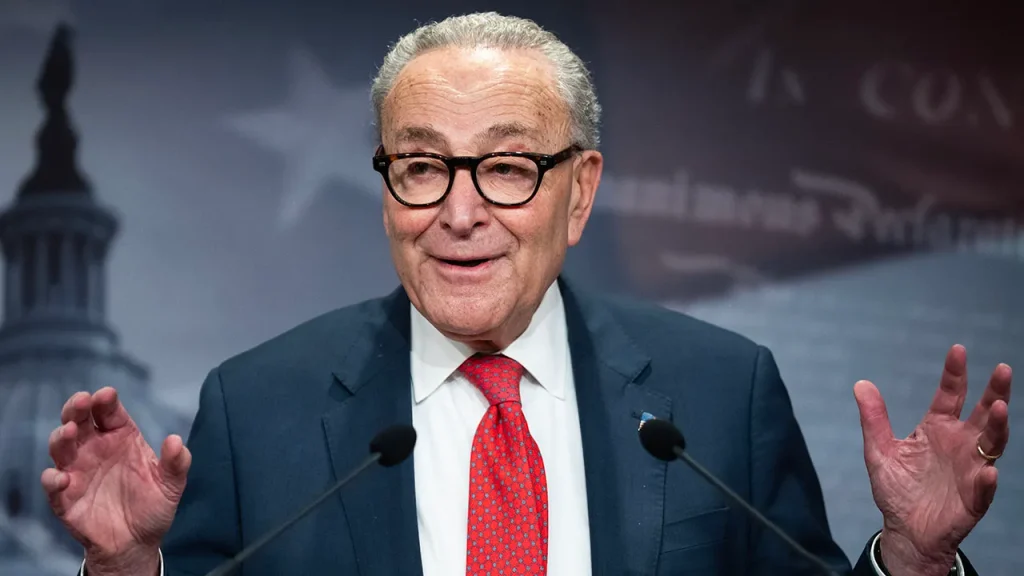Senate Moves Forward on Reopening Government as Democrats Join Republicans
In a significant development over the weekend, the Senate took a major step toward ending the 40-day government shutdown as a group of Senate Democrats broke ranks with their party leadership to support Republicans’ plan to reopen federal operations. This dramatic shift in the ongoing political stalemate signals that the end of the shutdown may finally be in sight, bringing potential relief to thousands of federal workers and the services they provide.
The breakthrough came when eight Democratic senators crossed the aisle to vote with Republicans, marking the first successful step in the GOP’s strategy to end the impasse. Among those breaking with Senate Minority Leader Chuck Schumer were Senators Angus King (I-Maine), John Fetterman (D-Pa.), Catherine Cortez Masto (D-Nev.), Jeanne Shaheen (D-N.H.), Maggie Hassan (D-N.H.), Jacky Rosen (D-N.M.), Tim Kaine (D-Va.), and perhaps most notably, Dick Durbin (D-Ill.), the second-ranking Democrat in the Senate. Senator King explained their reasoning simply: “The question was, does the shutdown further the goal of achieving some needed support for the extension of the tax credits? Our judgment was that it will not.” This pragmatic assessment reflected a growing realization among some Democrats that the prolonged shutdown strategy wasn’t achieving their healthcare goals and was potentially causing unnecessary harm to federal workers and Americans relying on government services.
The compromise package that attracted bipartisan support includes several elements Democrats had sought, such as guaranteeing back pay for furloughed workers and reversing some of the Trump administration’s firings of federal employees during the shutdown. However, notably absent was the Democrats’ primary demand—an extension of expiring Obamacare subsidies. Instead, Senate Majority Leader John Thune (R-S.D.) promised only a future vote on the subsidies, which was reflected in the updated continuing resolution (CR). This arrangement essentially represents a significant concession by the Democrats who supported the measure, as they received little concrete assurance regarding their healthcare priorities. Schumer criticized the compromise, stating, “This healthcare crisis is so severe, so urgent, so devastating for families back home that I cannot, in good faith, support this CR that fails to address the healthcare crisis.” He further claimed that Republicans’ rejection of Democrats’ counter-proposal for a year-long subsidy extension showed “they are against any health care reform.”
The progressive wing of the Democratic party expressed particular disappointment with this development. Senator Bernie Sanders (I-Vermont) warned that Democrats caving on this issue would send a dangerous signal to former President Trump: “If Democrats cave on this issue, what it will say to Donald Trump is that he has a green light to go forward toward authoritarianism. And I think that would be a tragedy for this country.” Despite these concerns, the practical reality of ending the shutdown appeared to outweigh ideological considerations for the Democratic senators who broke ranks. The modified continuing resolution would fund the government until January 30, 2026, providing lawmakers ample time to develop proper spending bills rather than relying on stopgap measures or massive omnibus packages. As Senator John Hoeven (R-N.D.) cautioned, “If we blow this window, we’re going to get stuck with a yearlong CR,” highlighting the practical considerations driving the compromise.
Though this vote represents significant progress, several hurdles remain before the government can fully reopen. The Senate’s modified legislation will require additional votes before it can move to the House for approval and ultimately to President Trump’s desk for signature. Democrats still have procedural options to delay the process unless all 100 senators unanimously agree to expedite the remaining votes. Additionally, the fundamental healthcare issue continues to divide lawmakers. Senate Republicans have criticized how Obamacare subsidies channel money to insurance companies, while Democrats question whether Republicans’ stated concerns about healthcare are genuine. Senator Ron Wyden (D-Ore.) expressed skepticism about Republican intentions, saying, “The point, I think that’s really relevant here, is if they’re serious, and I really question whether that’s the case.”
As the process moves forward, the political calculus for both parties remains complex. Democrats must weigh the practical benefits of ending the shutdown against their policy priorities on healthcare, while Republicans must demonstrate they can govern effectively while maintaining their positions on spending and healthcare reform. The compromise represents a rare moment of bipartisan action in today’s polarized political environment, though it comes at a cost for Democrats who had hoped to secure healthcare guarantees as part of any agreement. For federal workers and the American public, the potential end to the shutdown offers relief from disrupted services and financial uncertainty, though the underlying policy disputes that led to the impasse remain largely unresolved. The next few days will determine whether this breakthrough leads to a full reopening of government or whether additional political complications will extend the shutdown further.


